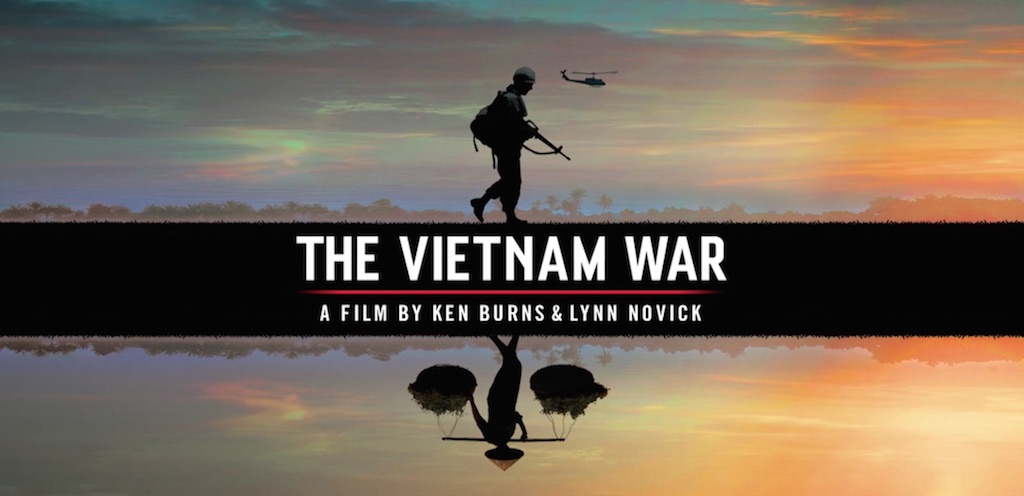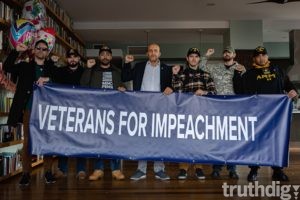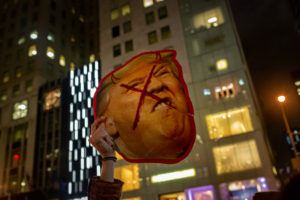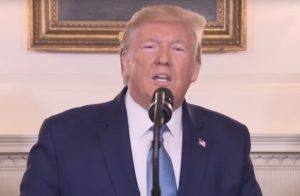Vietnam Myopia, 50 Years Later
“The Vietnam War” series by Ken Burns and Lynn Novick on PBS does not present, as its makers claim, a balanced view of the war. "The Vietnam War" is a 10-part, 18-hour documentary film series. (PBS)
"The Vietnam War" is a 10-part, 18-hour documentary film series. (PBS)
Official history is never going to be cool. There is no way that the political perspective of the historian, playwright and activist Howard Zinn could have gotten 18 hours of real estate on PBS as Ken Burns and Lynn Novick did for “The Vietnam War.”
Burns is a uniquely talented documentary artist and a masterful self-promoter whose new work has gotten the requisite acclaim by mainstream media like The Washington Post and The New Yorker and been met with equally predictable contempt by most writers who identify with the anti-war movement.
There are some significant virtues of “The Vietnam War” that should not be denied, as well as some myopic and misleading conventional wisdom that should not stand unanswered.
On the plus side, it is a significant accomplishment to have the PBS audience definitively told that Presidents Lyndon Johnson and Richard Nixon lied to the public repeatedly when they suggested that the war during their administrations was about protecting America from communism. By the end of 1965, the actual rationale for the dreadful conflict was to save face for presidents and their administrations rather than any moral or national security reasons. This perspective was radical at the time, and to have it validated in the closest thing America has to official history is a big deal.
On the other hand, “The Vietnam War” is not the balanced view of the war that its makers claim it is. The power of propaganda is not limited to influence on poorly educated fans of populist demagogues. As David Halberstam demonstrated in his Vietnam book, “The Best and the Brightest,” well-educated elites also can succumb to magical thinking in pursuit of status.
In an interview with Charlie Rose (who called the series “amazing”), Burns insisted that his team was determined not to put a “thumb on the scale.” Geoffrey Ward (writer of Peter Coyote’s voice-over narration) was supposedly so committed to objectivity that he often purged adjectives. Nonetheless, the power of conventional wisdom on the production is so powerful that within the first minute, Coyote’s voice insists that the war “was begun in good faith by decent people out of fateful misunderstandings, American overconfidence, and Cold War miscalculation.” As The Dude said in “The Big Lebowski”: “That’s your opinion, man.”
For the first time in mass media, the series presents personal stories from Vietnamese on both sides of their civil war in a way that humanizes them for an American audience. The interviews with veterans and journalists of the period are done with nuance and emotional resonance that are among the best of the Burns/Novick canon.
However, the narrative conspicuously avoids the dark context that led to President Dwight Eisenhower’s fanciful “domino theory,” the idea that internal disputes in Southeast Asian countries could result in a change in the international balance of power between the United States and communist countries and threaten American security. American political culture in the years leading up to the Vietnam War was toxically removed from reality to the extent that earnest, well-educated schoolteachers were obligated to tell schoolchildren with a straight face the truth that the United States policy did not “recognize Red China,” (which in real life had the largest population of any country in the world) and that hiding under the desk would make them safe from the effects of a nuclear bomb.
The series makes no mention of former Vice President Henry Wallace’s vain attempt to restrain Harry Truman from pursuing the Cold War in the late 1940s, nor of the dispute between Truman and Gen. Douglas MacArthur about expanding it a few years later. Most negligently, given the political pressure presidents would succumb to during the war, the awful shadow of McCarthyism that intimidated many politicians, especially Democrats, is not referenced.
Neither is the pattern of interference in many countries by Eisenhower’s secretary of state, John Foster Dulles, and his brother and CIA Director Allen Dulles. Also missing is Eisenhower’s final speech as president in which he warned of the influence of the military-industrial complex. One doesn’t have to be a Marxist to acknowledge that huge profits were made from the Cold War. The first song used in “The Vietnam War” is Bob Dylan’s “A Hard Rain’s A-Gonna Fall,” but unfortunately it fades out before he gets to the line “the executioner’s hand is always well hidden.”
A significant virtue of the series is its unflinching depiction of the grotesque brutality of the war. Anything that reminds the mass brain that war is hell is a huge contribution in the current American culture, which is often intoxicated by fake violence in video games and professional wrestling.
However, the subtext of the “Vietnam War” seems to suggest that the tragedy of the war had a disembodied inevitability rather than having been the result of bad moral choices by smart, well-informed, powerful people. The series does not speculate on what President John F. Kennedy would have done if he had not been assassinated. The producers have pointed out President Johnson’s foreign policy team consisted of JFK appointees. However, Kennedy might have heeded Robert McNamara’s private reservations about the war instead of ignoring them as LBJ did. Moreover, the subsequent opposition to the war by Kennedy’s closest adviser—his brother Robert Kennedy—is a pretty good clue that JFK would not have increased the American presence in Vietnam from 16,000 soldiers to over half a million as Johnson did (in “good faith”).
Finally, the series presents a distorted and limited view of the anti-war movement. Activist Bill Zimmerman is the only one of 18 on-camera narrators who was against the war from the beginning, and he is cogent and morally grounded. Yet for most of the 10 episodes, while the courage and suffering of veterans is appropriately revealed, except for a few veterans who later turned against the war, anti-war figures are depicted as two-dimensional stick figures.
The producers chose to ignore the Quaker, Catholic and other pacifist sides of the movement and also left out counterculture figures like the Yippies. They barely touched on the anti-war sentiments in the artistic or academic worlds and give little or no time for the arguments of early anti-war intellectuals like Tom Hayden, Staughton Lynd or Cora Weiss. Wayne Morse, the most eloquent U.S. senator against the war, is given a single sentence. There is less than a minute of Dr. Martin Luther King Jr.’s speech against the war in April 1967, and no one in King’s inner circle appears on camera.
Further distorting the anti-war movement in a way that smells of old-school propaganda, the series focuses on extreme moments that represented only a minuscule percentage of the movement. There are close-ups of a few Viet Cong amid hundreds of thousands of protesters and several references to long-hairs calling returning vets “baby killers” despite the fact that extensive research has revealed very few such incidents.
Presidents Johnson and Nixon are said to have believed that the anti-war movement was orchestrated by foreign communists, but given the information available to them, it seems more likely that they knew otherwise and used the trope for pubic relations purposes.
This is not to deny that North Vietnam was happy to exploit protest when it served its purpose. There is a cringe-worthy sound bite of Jane Fonda suggesting that some captured Americans may have been guilty of war crimes, but there is no reference to her later apologies for that chapter of her life or for her extensive work in subsequent years with anti-war veterans. This selectivity is not ideologically neutral.
Similarly, the producers made a decision to exaggerate the importance of the delusional and violent Weather Underground (whose following was measured in the hundreds) but not to include the evolution of millions in the anti-war movement after the May Day protest in 1971. (Zimmerman went on to be involved with many effective campaigns without violence, including Medical Aid for Indochina and several years of effective lobbying that led at long last to Congress pulling funding from the war.)
As members of the anti-war movement age, we need to resign ourselves to the fact that official history is not going to acknowledge the best of us. The year before he died, Tom Hayden spoke to a meeting of hundreds who had been in the anti-war movement. He lamented that President Barack Obama had recently acknowledged the importance of the gay rights, feminist and civil rights movements but did not mention the anti-war movement. Speaking of Defense Department propagandists, Hayden concluded: “We have to resurrect ourselves from the oblivion they have already prepared for us.”
The moral, intellectual and spiritual depth of the anti-war movement, even warts and all, is not going to be the subject of a PBS series. A more truthful perspective will only be found in unofficial history and art like Allen Ginsberg’s “Wichita Vortex Sutra,” and the full albums of artists like Phil Ochs. One could do far worse than watching Oliver Stone’s underrated “The Untold History of America.”
Yet for all its myopia, it’s very encouraging that “The Vietnam War” exists. Like the modern Democratic Party, the series is sometimes corrupted and timid, but it also is far better than any of the alternatives in the treacherous mass arena where it lives.
—–
Danny Goldberg is the author of the recent book “In Search of the Lost Chord: 1967 and the Hippie Idea.”
Your support matters…Independent journalism is under threat and overshadowed by heavily funded mainstream media.
You can help level the playing field. Become a member.
Your tax-deductible contribution keeps us digging beneath the headlines to give you thought-provoking, investigative reporting and analysis that unearths what's really happening- without compromise.
Give today to support our courageous, independent journalists.









You need to be a supporter to comment.
There are currently no responses to this article.
Be the first to respond.